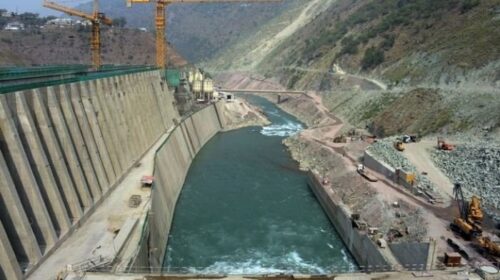Pakistan and India began three days of crucial talks Tuesday at the Permanent Commission of Indus Waters (PCIW) level on a six-point agenda that includes hydropower projects on the Chenab River such as Pakal Dal (1,000MW), Kiru (624MW), and Lower Kalnai (48MW), as well as other projects on the Indus in Ladakh.
The agenda for the three-day talks also includes Pakistan’s objections to Tamasha Hydroelectric Power (HEP), Kalaroos-II HEP, Baltikulan Small, Darbuk Shyok HEP, Nummu Chilling HEP, Kargil Hunderman HEP, Phagla HEP, Mandi HEP, and Kulan Ramwari HEP.
Both sides held on Tuesday three rounds of talks and discussed the sharing of flood data, the programme of meetings and tours of PICW for the current calendar year 2022. Both sides also discussed the Kiru Hydropower Project, one of the officials who were part of the talks told The News.
The nine-member Indian side also comprises three female officers, headed by Pradeep Kumar Saxena, Indian Commissioner for Indus Waters. The Pakistan side, consisting of representatives of Wapda, Pakistan Met Dept, Punjab Irrigation, NESPAK, MoFA, Flood Commission and officers of PCIW, was led by Syed Mehr Ali Shah, Joint Secretary Water, who is also Pakistan’s Commissioner for Indus Waters.
The top official said that Pakistan asked India to restore sharing of the flood data on humanitarian grounds, which New Delhi continued to share from 1989 till 2018 and then started reducing the share of data with Pakistan in 2019. Pakistan pleaded that the flood data sharing is imperative for the Pakistan side to come into action on time to avoid the catastrophic impact of floods on human lives. “The Indian side has agreed to restore the sharing of flood data on time so that the Pakistan side can have ample time to help save human lives.”
Both sides have also finalised the tours and meetings to be held in 2022 at the PCIW level and, to this effect, Pakistan asked India to also include a special visit to the Kiru Hydropower Project under the provisions of the Indus Waters Treaty. India agreed to arrange a visit to the Kiru project. The official said that Pakistan in August last year had pinpointed some observations about the design of the Kiru project with the capacity to produce 624 MW of electricity being erected on the Chenab River and sought some clarifications. India on the project gave some clarifications, but Pakistan again raised some queries. India says that Pakistan should submit its queries on the project in written form, and New Delhi will respond in 15 days’ time.
According to the official, in the Tuesday meeting, the Indian side raised the issue of storm drainage nullah, specifically Fazal Ka nullah, which enters Sutlej from eastern Punjab in India and enters Sutlej from Pakistan’s side. India says that the free flow of water from Fazal Ka nullah is not being done because of some hindrances from Pakistan’s side. India says that under the treaty, free movement of water flow is imperative, otherwise the water comes back and destroys the area in India when a flood hits. The Pakistani side says that the Punjab Irrigation Department will respond to this issue and the Indian side will be informed accordingly.
“Both sides will today (Wednesday) discuss small hydropower projects being erected on Pakistan rivers, including the Pakal Dal and Lower Kalnai projects, and other projects,” the official stated.
Pakistan is of the firm view that the designs of the above-mentioned hydropower projects negate the provisions of the Indus Waters Treaty (IWT), but India claims they are treaty compliant. Under the IWT signed in 1960, the waters of the eastern rivers Sutlej, Beas, and Ravi, amounting to around 33 million acre-feet (MAF) annually, were allocated to India for unrestricted use. The waters of the western rivers Indus, Jhelum, and Chenab, totaling approximately 135 MAF per year, were largely assigned to Pakistan. However, India is permitted to construct run-of-the-river plants on western rivers with limited storage as per criteria specified in the treaty.
One of the members of the Pakistani side says that the contentious issues about the design of Pakal Dal (1,000MW) and Lower Kalnai would be resolved during the bilateral dialogue at the Permanent Commission of Indus Waters (PCIW) level. Pakistan has already raised objections to the Pakdal project in the last talks with India, under Article 9 of the Water Treaty. He expressed optimism that Pakistan’s objections to the freeboard of the Lower Kalnai project will be resolved during these talks. Pakistan wants the freeboard to be one metre in length, while India insists on a two-meter length.
However, top sources said that India has not only finished civil works but also almost completed the diversion tunnel for the Kiru Hydropower Project of 624MW on the Chenab River. According to the sources, “On the site of the Kiru project, work on the diversion tunnel, excavation of the main access tunnel, and audit of top and bottom pressure shaft is in progress, along with the dam’s abutment stripping. The project is scheduled to be completed by 2023. The dam has a height of 136 metres and a width of over 190 meters. “
Indian engineers have almost completed the construction of the first diversion tunnel, having a length of over 650 metres and a 9-meter diameter. More importantly, the over and inverted concreting of the tunnel is almost nearing completion.







